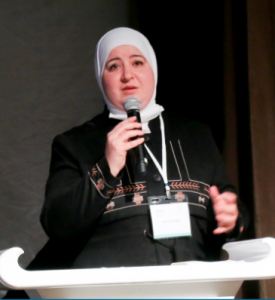
The displacement journey was harsh, its bad effects still haunt the forcibly displaced from their homes. But less than a month in the north, Nevin started again. She had worked with the women of Easter Ghouta under siege and bombardment. In the north, in her newly found home she started working with women again, but this time with a larger segment, working with both the displaced and the locals, Arabs, Kurds and Turkmen, cross-cutting age, economic level and cultural backgrounds.
Nevin Al-Hawtari is a graduate of the Intermediate Institute for Business Administration, who had worked for 11 years before the revolution as a project manager in a private company. With the first signs of the siege of Eastern Ghouta, she made a decision to stay and not leave for any reason until she was forced out. This is what happened. She was forcibly displaced to the north of Syria through, put on a green bus with others and sent up north in a convoy.
Nevin began her volunteer work in the field of child-education during the first years of the siege in Ghouta. Nevin and people like her wanted to make sure education continued after the schools were closed. She, like the others, were targeted by the Assad regime and its destructive missiles. The aerial bombardment and siege led to many problems, including shortage of educational staff. However, some teachers in the area decided to cover the need in those years.
Nevin chose to work with women. She started her work through a questionnaire she designed to learn about their actual needs and priorities under the blockade, especially the dim prospects. She also worked as a women’s coordinator for years under siege. She pushed women to work and be self-reliant as many women were staying home after losing their jobs or dropping out of school or college after the blockade, the cutting of roads, and closing of humanitarian corridors between regions.
Additionally, Nevin played a great role in motivating a number of university women to participate and work in civil society organizations. Together they formed a women’s committee that had the largest share in implementing specific projects in the region. They provided intensive training for women on several topics, including governance and women’s leadership, and encouraging them to participation in civil work. Nevin later moved to a more advanced political involvement, specializing in the political empowerment of women within a civilian network concerned with political affairs that included 45 women inside Ghouta. However, with the military developments on the ground, and the entry of Assad’s forces into the area, Nevin and her colleagues were forced to leave their homes, schools and centers in Ghouta. Nevin, then, contributed to re-launching a new entity that brings Syrian women together women in the northern and eastern countryside of Aleppo.
Nevin heard about specific trainings directed at women launched by Tastakel organization, so she contacted her administration and requested that the trainings be held in the northern countryside as well so that her team and the women participating with her could benefit from the courses. This was conducted successfully. Tastakel administration responded to the request of Nevin and her team, and the first session was in the city of Azaz including members from the Women’s Support and Empowerment Unit. The training they obtained had a great impact on their abilities for project development, as it coincided with the implementation of one of the election projects for the sub-committees with training on elections within Tastakel organization. The trainings the women received on governance and election law had the greatest impact on the success and implementation of the project. Nevin appreciated the courses on conflict management and negotiation training, communication and leadership skills, human rights and gender, all of which formed for Nevin and her team a cornerstone in providing qualitative knowledge to the trainees and raising their expectations about the political process. They started thinking differently about the role of women leadership in forming a new Syria. Nevin and some members of her team also did the advanced mentoring program with Tastakel.
Nevin’s journey with Tastakel was followed by other developments. She had the opportunity to join some women in Tastakel and research and read material to expand the partial participation of women in the electoral process, theoretically; and during the same period that she was working on preparing papers explaining how women participate, the local council of a town in the liberated countryside of Aleppo conducted restorative elections for the local council. Nevin had a role in monitoring these elections as part of civil society networks. She also participated in awareness sessions for women to urge them to run for office and participate in the electoral process. Nevin was able to prove her presence in all stages of the electoral process on the ground from awareness to voting, and to counting at the end of the electoral process. What she learned in the sessions that were given by Tastakel on elections made her proud of her new electoral experience. She has hopes of witnessing one day presidential elections in her country in which women could run for offices, and dreams of participating with her friends, in the electoral process according to the new standards that would sustain democracy and rule of law in a new Syria.
